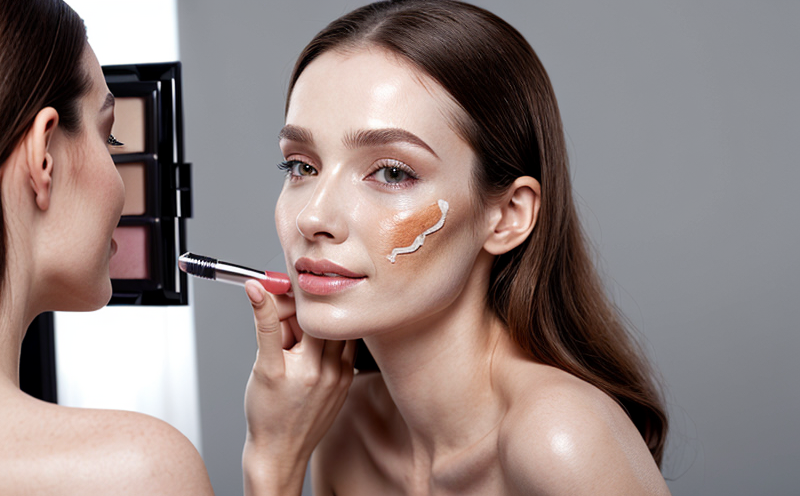Dermatological Safety Testing of Psoriasis Relief Cosmetics
Psoriasis is a chronic autoimmune skin disease that affects millions worldwide. The management of psoriasis involves various treatments, including topical creams and lotions designed to relieve symptoms such as itching, scaling, and inflammation. Ensuring the safety and efficacy of these cosmetics through rigorous testing is paramount for both patient well-being and regulatory compliance.
Our dermatological safety testing service focuses on evaluating the potential risks associated with using psoriasis relief cosmetics. This involves a comprehensive approach that includes in vitro tests to assess irritancy, comedogenicity, phototoxicity, and other relevant parameters. These tests are conducted according to international standards such as ISO 10993-10 for biocompatibility assessments and ASTM F854 for dermal irritation.
The testing process begins with the preparation of the cosmetic specimen, which is carefully formulated to mimic real-world conditions. Specimen preparation ensures that the product being tested accurately represents what will be used by consumers. This step includes ensuring the correct concentration of active ingredients and any necessary excipients. Once prepared, the samples are subjected to a series of tests designed to evaluate their impact on human skin.
The first phase involves in vitro testing using cultured human keratinocytes or reconstructed human epidermis models. These models provide a realistic simulation of human skin response without exposing actual patients to potential risks. This approach is particularly valuable for assessing irritancy and sensitization, which are critical aspects when dealing with psoriasis relief products.
Following the in vitro testing phase, we conduct in vivo studies if required by regulatory bodies or additional client requests. In vivo tests involve applying the cosmetic formulation to a small group of human volunteers under controlled conditions. This allows for the observation of real-world reactions and effects on individuals who may have similar skin characteristics as those suffering from psoriasis.
The results from both in vitro and in vivo testing are meticulously analyzed using advanced analytical techniques. Our laboratories employ state-of-the-art equipment such as confocal microscopy, spectrophotometry, and high-performance liquid chromatography to ensure precise measurements and reliable data. The analysis helps determine the safety profile of the cosmetic formulation by quantifying any adverse effects or potential allergens.
Based on these findings, our team prepares detailed reports tailored specifically for each client. These reports outline not only the results but also recommendations for improving formulations if necessary. Compliance with relevant international standards is guaranteed throughout every stage of testing and reporting to ensure that products meet stringent quality control requirements.
The importance of dermatological safety cannot be overstated, especially when dealing with sensitive conditions like psoriasis where even minor ingredients could exacerbate symptoms or cause adverse reactions. By providing thorough and accurate data through our comprehensive testing process, we aim to contribute significantly towards developing safer and more effective treatments for patients suffering from this condition.
Customer Impact and Satisfaction
In today’s competitive market, customer satisfaction is key to success. By offering top-notch dermatological safety testing services, we help our clients meet regulatory requirements while enhancing their reputation among consumers seeking high-quality products. Our detailed reports provide valuable insights into the performance of new formulations or modifications made during development stages.
For quality managers and compliance officers responsible for ensuring product safety and efficacy, having access to reliable test results ensures they can make informed decisions regarding production processes and ingredient selection. This leads to better outcomes when it comes time for market launch or expansion into international markets where different regulatory frameworks apply.
R&D engineers benefit greatly from our services as well since they gain deeper knowledge about the behavior of specific ingredients under various conditions. Armed with this information, they can optimize formulas to achieve desired effects while minimizing risks associated with potential side effects.
Our comprehensive testing also helps procurement teams identify suppliers who adhere strictly to quality standards and best practices in manufacturing. This fosters long-term partnerships based on mutual trust and shared goals of delivering superior products to end users.
International Acceptance and Recognition
The global nature of the cosmetics industry means that many companies seek recognition from various regulatory bodies around the world. Our laboratory adheres strictly to international standards such as ISO, ASTM, EN, and IEC when performing our tests.
For instance, adherence to ISO 10993-10 ensures compatibility with European Union regulations regarding medical devices and biocompatibility of materials used in contact with human skin. Similarly, compliance with ASTM F854 guarantees consistency with American standards for predicting dermal irritation potential.
The acceptance of our test results by regulatory authorities across different countries further enhances the credibility of our services. This broad recognition not only opens doors to new markets but also strengthens relationships between clients and their customers globally.
Competitive Advantage and Market Impact
In a highly competitive market, having robust dermatological safety testing capabilities can give companies a significant edge. Not only does it ensure compliance with legal requirements but also demonstrates commitment to product quality and consumer health.
Achieving stringent international standards early in the development process allows brands to enter new markets more quickly without facing delays due to additional testing or certification processes required by local laws. This agility can translate into faster time-to-market, which is crucial for staying ahead of competitors.
Moreover, successful completion of our dermatological safety tests can enhance brand reputation among consumers who prioritize health and wellness in their purchasing decisions. Positive reviews and testimonials from satisfied customers can lead to increased sales volume and brand loyalty over time.





